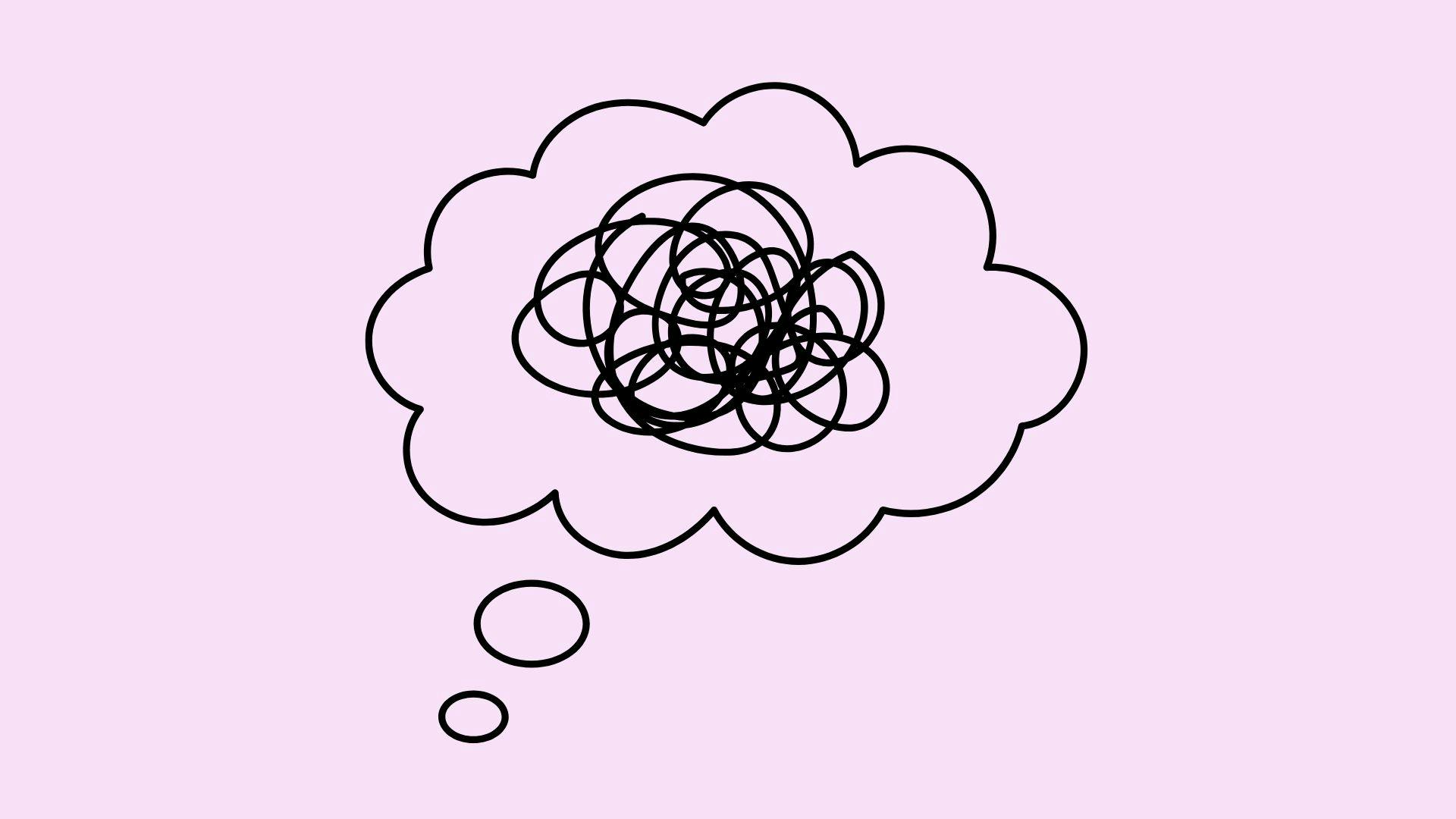If you’ve ever ended a long day of therapy sessions and faced a backlog of progress notes, you’re not alone. For most mental health professionals, note writing is one of the biggest sources of burnout. From SOAP notes to DAP notes to treatment plans, the paperwork often takes more time than the actual client work.
That’s where AI progress note generators come in. These tools use AI technology to create structured progress notes quickly and securely, allowing you to save time, reduce after-hours work, and focus on patient care.
In this guide, we’ll break down the best AI progress note generators in 2026, their key features, pricing, and how they can transform your clinical documentation.
What is a Progress Note?
A progress note is a type of clinical documentation that records a client’s progress during therapy sessions or other patient visits. It includes the client’s current status, important details from the session, interventions used, and the next steps in their treatment plan.
Progress notes help:
- Track a client’s progress over time
- Provide a legal record of care
- Ensure continuity across providers in group practices or integrated healthcare professional teams
- Document medical necessity for insurance reimbursements
Common note templates include:
- SOAP notes (Subjective, Objective, Assessment, Plan)
- DAP notes (Data, Assessment, Plan)
- BIRP notes (Behavior, Intervention, Response, Plan)
Progress notes are not just paperwork; they’re an essential part of maintaining compliance, protecting patient privacy, and supporting quality patient care.
What Is an AI Progress Note Generator?
An AI progress note generator (sometimes called an AI therapy notes generator or AI note generator) is an AI powered tool that helps therapists and other healthcare providers turn session notes into compliant SOAP, DAP, or BIRP notes.
Here’s how it works:
- Input: A session summary, shorthand notes, or even full session recordings from in-person or telehealth patient interactions.
- AI Process: The tool organizes your input into structured clinical notes with an objective portion, assessment, and plan.
- Output: AI generated notes that align with your preferred note format, ready to add to a patient’s chart or EHR.
The result: therapy notes and treatment plans that are faster to produce, compliant, and still reflect your clinical expertise.
Why Mental Health Professionals Are Switching to AI Progress Notes
For years, therapists have relied on manual note writing after every client session. While necessary, the process is often time-consuming, repetitive, and mentally draining. Many clinicians spend late nights finishing therapy notes, which eats into their free time and overall mental space.
Here’s why more providers are adopting an AI progress note generator in 2026:
- Time savings → Draft structured progress notes in minutes instead of hours.
- Compliance and security → Generate compliant SOAP notes and DAP notes that meet Accountability Act standards and protect sensitive patient health information.
- Flexible input options → Whether through session recordings, in person sessions, or bullet points, AI adapts to your workflow.
- Better patient care → Less admin work means more focus on treatment planning, session quality, and overall well-being of clients.
- Game changer for group practices → Consistent formatting and easy access to generated notes help teams stay aligned.
For most mental health professionals, switching to AI progress notes isn’t just about convenience, it’s about reclaiming energy, reducing burnout, and having full control over how documentation fits into their daily practice.
The Best AI Progress Note Generators Therapists Actually Use
Now that you understand why many mental health professionals are switching to AI progress note generators, we’ve reviewed some of the top options that they actually use.
And here’s what you need to know before choosing the right one for your practice.
1. Supanote
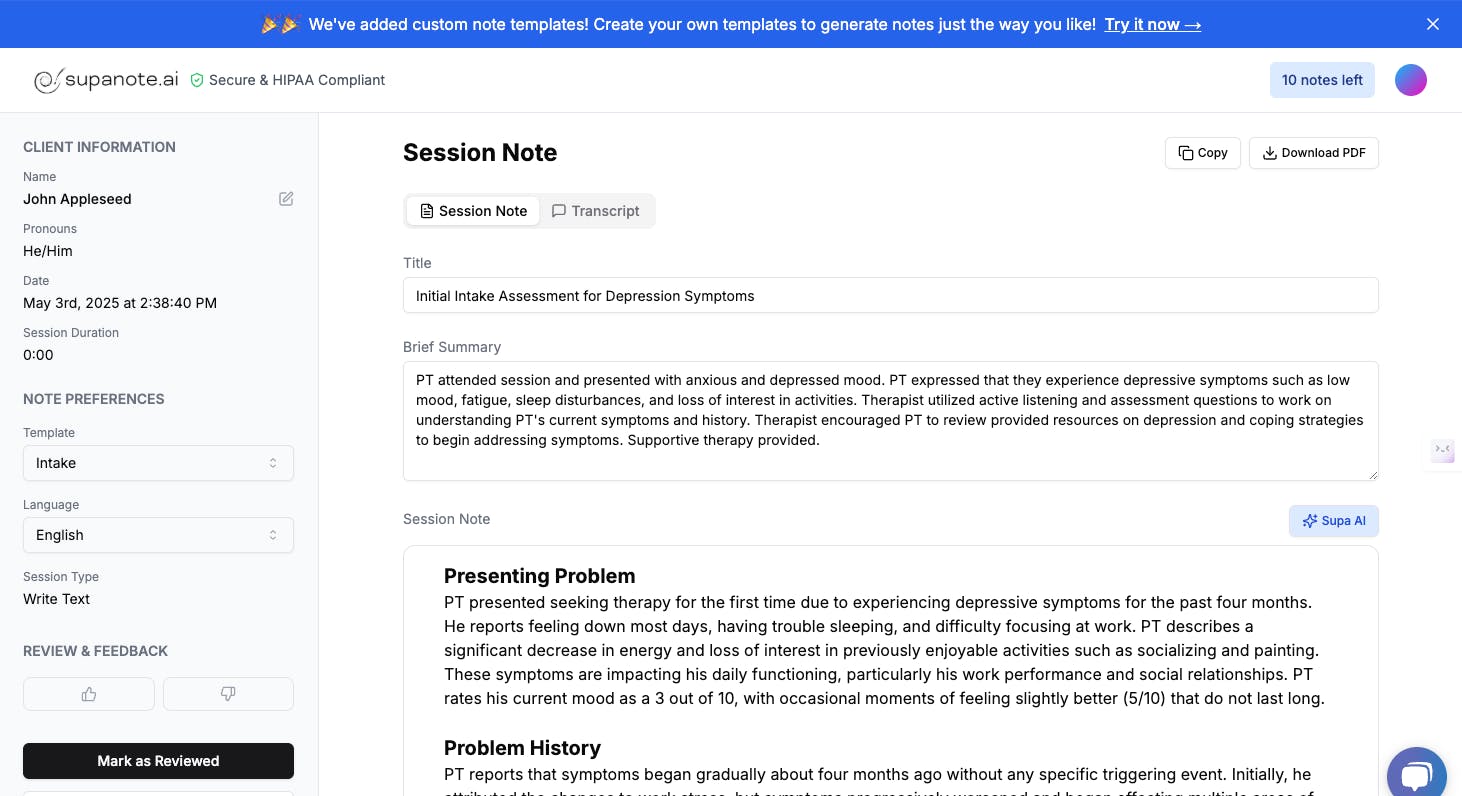
Supanote is built specifically for mental health professionals, not generalized for healthcare. It supports multiple note templates (SOAP, DAP, BIRP, EMDR, group therapy) and ensures notes are audit-ready for insurance.
Its standout feature, Super Fill, allows notes to flow directly into your EHR by eliminating copy-paste and reducing note-taking time by up to 50%, freeing clinicians to spend less time on admin and more time with clients.
Pros:
- Designed specifically for therapy notes (not repurposed medical dictation)
- Personalization options – remembers writing style, terminology, and therapeutic approach
- Multiple formats including SOAP, DAP, EMDR, and group notes
- High-quality drafts with insurance-ready formatting
- Human support team available for quick, reliable help
- HIPAA-compliant with BAA included
- EHR autofill saves time and reduces errors
- Affordable entry-level plan
Cons:
- Limits on notes in the basic plan
- Currently focused on mental health (not multi-disciplinary)
Pricing: Starting at $19.99/month for 40 clinical notes, Professional at $39.99/month for 100 notes, Premium at $69.99/month for unlimited notes (annual billing)
Best For: Therapists in private practice or group practices who need compliant, therapy-specific notes with EHR integration.

2. Freed
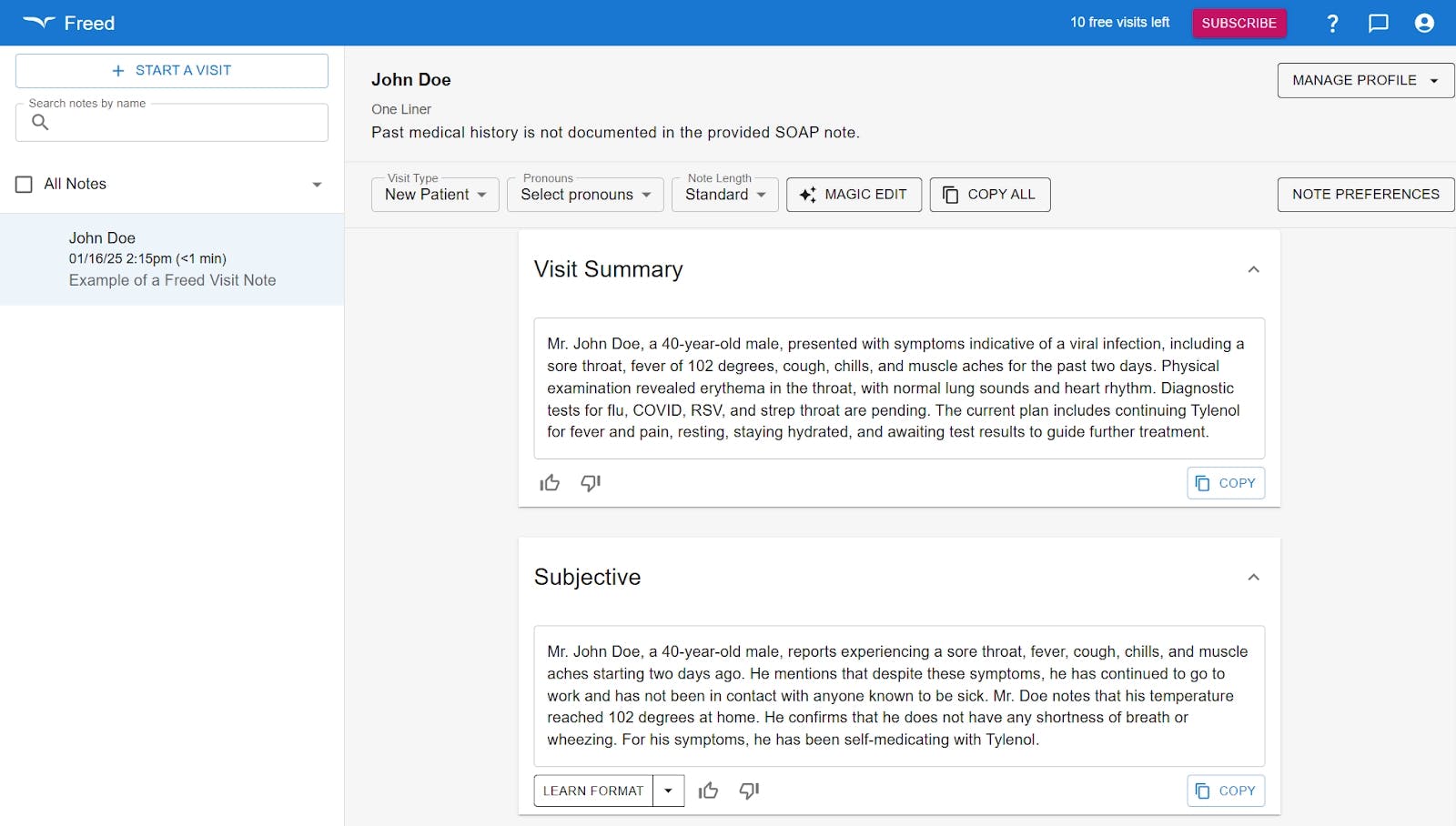
Freed works like a virtual scribe: it listens during therapy sessions (with client consent), transcribes, and generates compliant SOAP notes. For therapists with a heavy caseload, its monthly unlimited notes plan is a game changer. Freed is HIPAA-compliant, ensuring patient privacy and secure handling of sensitive patient health information.
Pros:
- Unlimited notes for predictable monthly cost
- Fully automated transcription + note generation
- Hands-free workflow, just review and finalize
- HIPAA-compliant with secure data storage
Cons:
- Requires recording sessions, which some clients may resist
- No per note pricing for light caseloads
Pricing: It starts at $90/month for solo clinicians, $84/month per clinician for 2–9 users (billed annually), and custom pricing for 10+ users. A 7-day free trial is available; no credit card is required.
Best For: Clinicians with large caseloads who want unlimited, hands-free AI progress notes from recordings.
3. Upheal
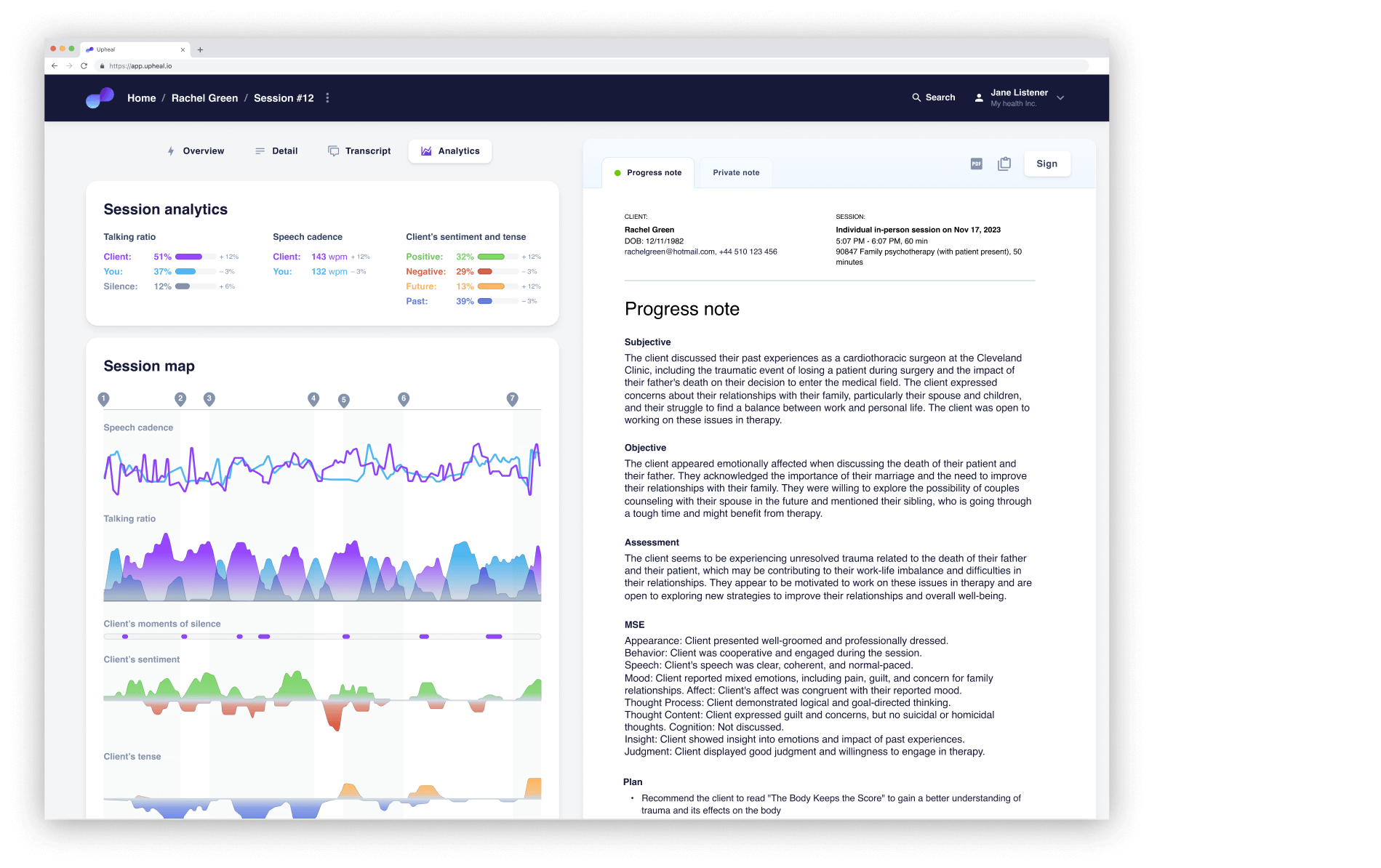
Upheal offers AI progress notes in SOAP and DAP formats but adds another layer: analytics. From session recordings, it produces notes and data on patient interactions, talk ratios, tone, and patterns that help you track a client’s progress over time. It blends clinical notes with insights for outcome-focused care.
Pros:
- Combines notes with session analytics
- Tracks talk ratios and client trends
- HIPAA-compliant and privacy-focused
- Free plan with unlimited basic notes
Cons:
- Requires session recording to unlock analytics
- More features than some therapists may need if they just want notes
Pricing: Free plan (£0/month, unlimited notes), Starter £19/month, Premium £59/month.
Best For: Therapists who want both AI generated notes and deeper insights into session dynamics and outcomes.
4. Quill Therapy Notes
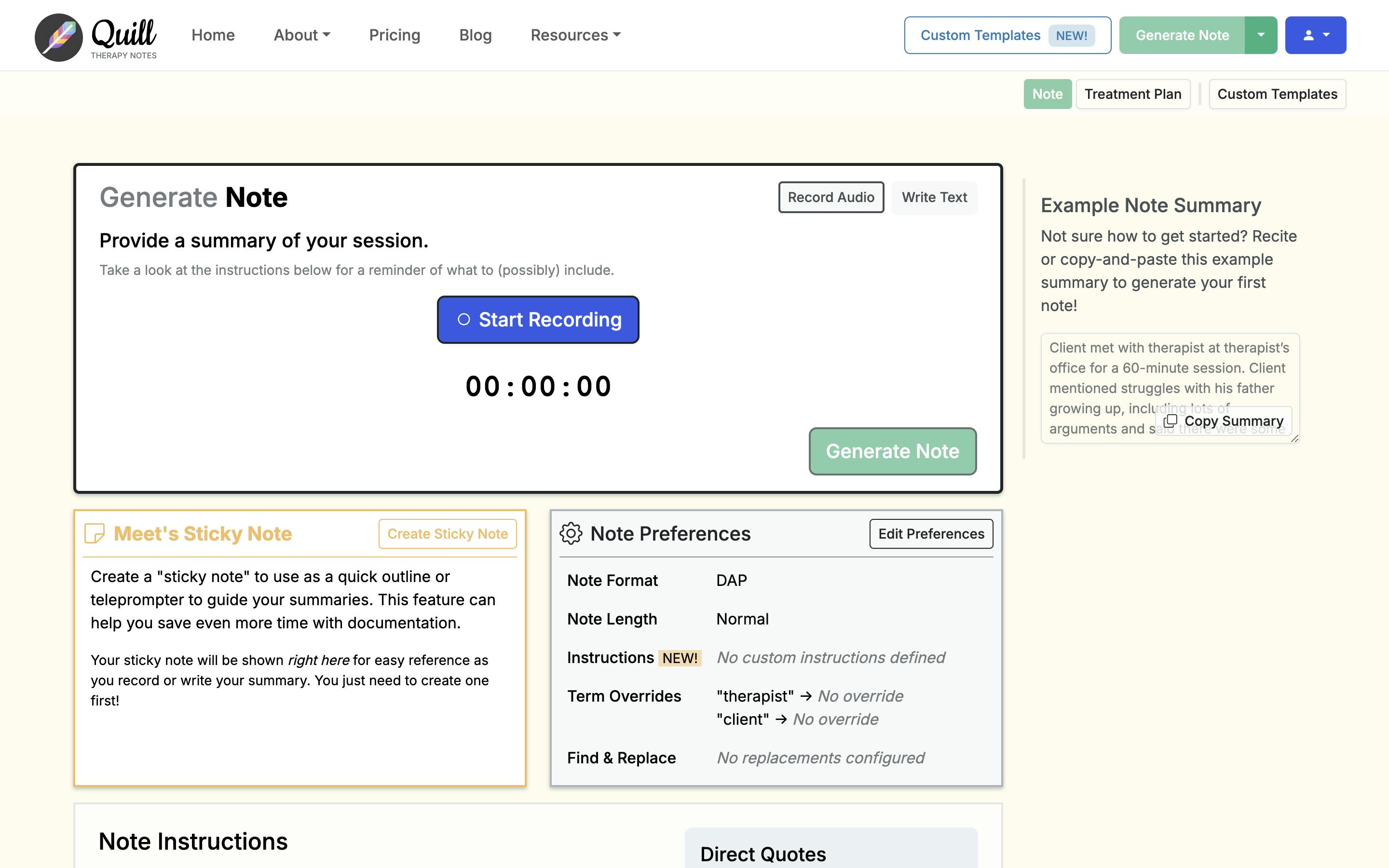
Quill is a progress note generator for therapists who prefer not to record sessions. Instead, you type bullet points or a session summary, and Quill expands them into structured SOAP or DAP notes. It’s fully HIPAA-compliant, giving you full control while protecting sensitive patient health information.
Pros:
- No session recordings required
- Fast and simple workflow
- Supports SOAP and DAP notes
- Prioritizes patient privacy
Cons:
- Requires more manual input compared to recording-based tools
- Lacks extra features like analytics or EHR autofill
Pricing: $20/month for unlimited notes (individual or team plans, +$16/month per additional team user); custom pricing available for enterprise plans with advanced integrations.
Best For: Therapists who want quick AI therapy notes without relying on recordings.
5. AutoNotes
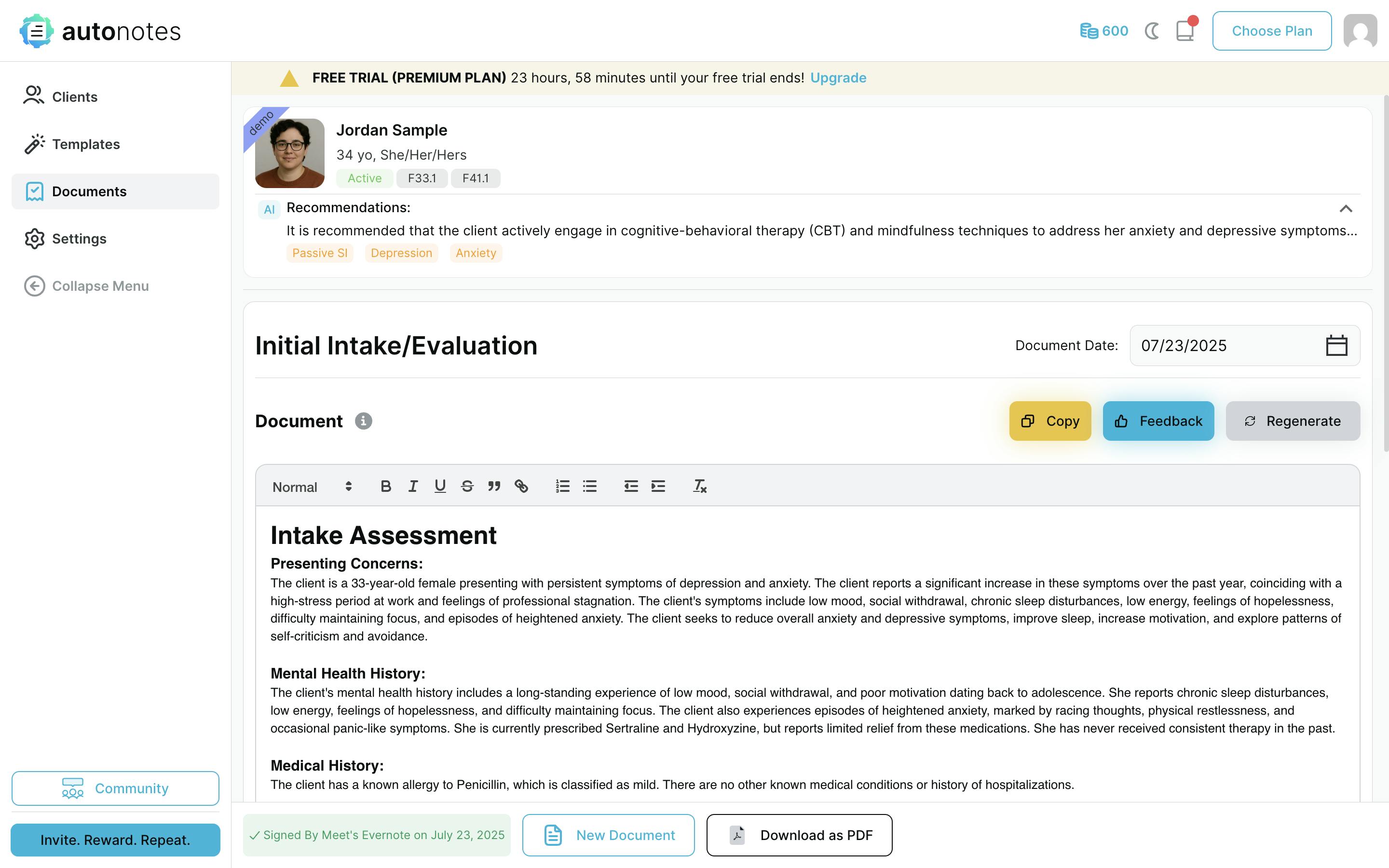
AutoNotes is a versatile AI-powered note-taking system for therapists, coaches, doctors, massage therapists, and physical therapists. It creates structured progress notes for in-person sessions, patient visits, or recordings. Its adaptive AI models learn your documentation style over time, improving accuracy with each use.
Pros:
- Works across multiple healthcare providers (not just mental health)
- Supports SOAP, DAP, and BIRP formats
- Adaptable to different practice types
- HIPAA-compliant
Cons:
- Not therapy-specific; less tailored than Supanote
- Pricier than lightweight therapy-only tools
Pricing: Starts at $39/month (per note pricing also available).
Best For: Multi-disciplinary practices that want one AI note generator across different specialties.
6. Mentalyc
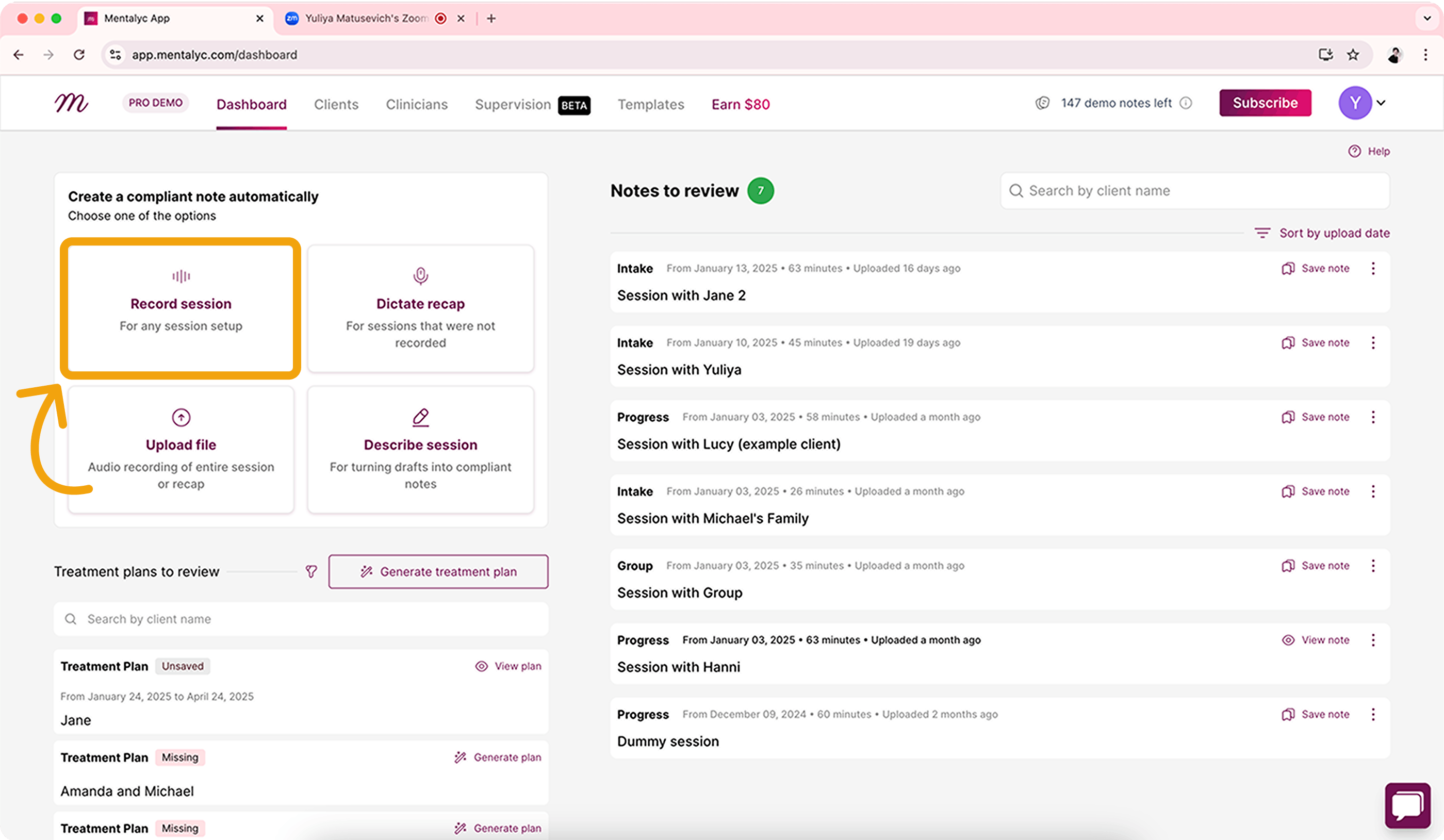
Mentalyc is an AI platform designed specifically for therapy and mental health professionals. It converts therapy sessions (via audio, dictation, or manual typing) into structured notes, treatment plans, and progress tracking. It supports multiple modalities (including family, couple, and play therapy), many templates (like BIRP, PIRP, EMDR, etc.), outcome tracking, and insights. It is HIPAA-compliant.
Pros:
- Very therapist-focused: lots of template options, modalities, and clinical relevance.
- Strong compliance and privacy features.
- Includes treatment plan generation + progress tracking, not just raw note transcription.
- Offers free trials / freemium type model (some free notes) so you can test without full commitment.
Cons:
- Could be more expensive for “pro/unlimited” tiers.
- Some therapists may find the number of options or templates overwhelming.
- Users sometimes report that AI-transcribed sections need manual cleanup. (Pretty common with all these tools.)
Pricing: Mini at $19.99/month (40 progress notes), Professional at $39.99/month (100 notes), Premium unlimited notes at $69.99/month. 7-day trial available.
Best For: Therapists or mental health practices wanting a robust, therapy-centric system with many templates and strong insight/outcome tracking, especially if working across different client types (individual, family, group).
7. DeepScribe
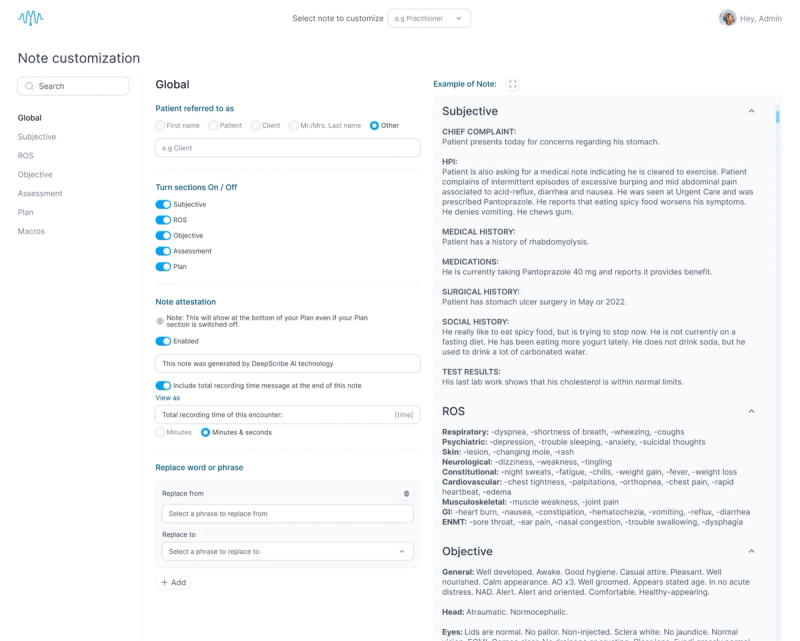
DeepScribe is an ambient AI medical scribe tool that listens to patient-clinician conversations (with consent), filters out small talk, and generates specialty-specific note drafts. It integrates with many EHRs and supports contextual awareness (bringing in relevant prior notes, labs, etc.). The tool aims to reduce documentation burden so clinicians can focus more on patients.
Pros:
- Very strong EHR integrations.
- Ambient operation: doesn’t require “wake words” or special manual trigger (after setup).
- Good for long-term documentation needs; pulls forward past history and supports longitudinal notes.
- High level of accuracy and customization by specialty.
Cons:
- Because it’s more medical/health system oriented, might be overkill (in features or cost) for smaller therapy-only practices.
- Ambient listening raises privacy/consent concerns (but DeepScribe is HIPAA-compliant).
- Pricing is less transparent for small configs; likely higher for full features.
Pricing: DeepScribe pricing starts at $400/month per provider for the non-EHR plan, with custom pricing for EHR-integrated plans that offer enhanced functionality and direct EHR sync.
Best For: Clinicians or organizations needing enterprise-grade documentation, with many patients, many specialties, and existing EHR workflows; ones who want ambient note generation.
8. Abridge
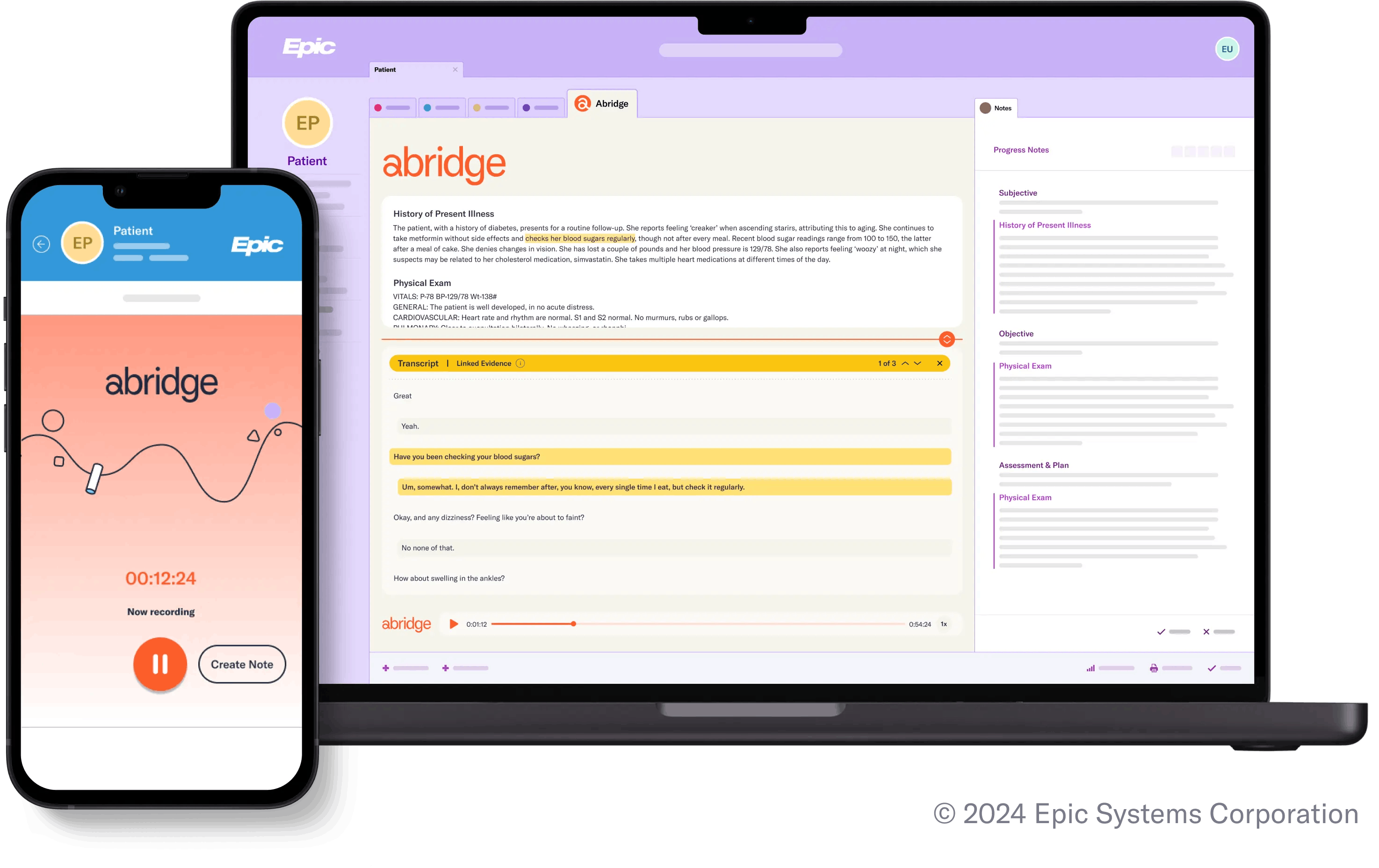
Abridge uses ambient listening + natural language processing to capture relevant clinical conversation, then summarizes it into draft notes. It works in outpatient, emergency, and now inpatient settings. It distinguishes between relevant clinical content vs “chitchat,” helps with note summaries, and is being integrated into hospital workflows (e.g. Epic) in some places. It also supports note types like progress notes, consult notes, etc.
Pros:
- Ambient, real-time or near real-time capture of session content.
- Distinguishes clinically relevant content vs non-essentials.
- Multiple care settings: outpatient, emergency rooms, inpatient (with expansions).
- Strong validation, partnerships with large health systems.
Cons:
- Focus is very much on medical / hospital settings, which may have requirements or workflows that differ from therapy practices.
- Requires review of drafts; AI doesn’t replace clinical judgment.
- Pricing tends to be higher in enterprise/hospital settings; less clarity for solo therapists.
Pricing: Estimated pricing for Abridge starts at $250 per month.
Best For: Providers in hospital systems or outpatient clinics wanting ambient capture, strong tech integrations, and tools to reduce documentation time in high-volume settings.
9. Suki
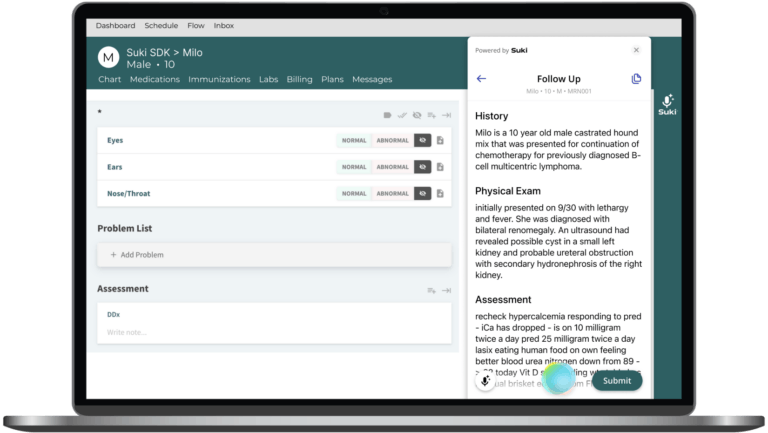
Suki AI is a voice-driven AI powered note-taking tool that lets clinicians dictate during or after sessions. It automatically converts speech into structured SOAP notes, treatment plans, and other documentation. It’s HIPAA-compliant, integrates with major EHRs, and is widely used in both medical and behavioral health contexts.
Pros:
- Strong speech recognition for dictation workflows
- Integrates with EHRs for seamless note management
- Supports SOAP and treatment notes
- Reduces time spent on manual typing
Cons:
- Less therapy-specific (no EMDR or group templates)
- Pricing is higher than lightweight therapist-only tools
Pricing: Custom pricing
Best For: Clinicians who prefer dictating notes rather than typing and want a hands-free AI assistant.
10. Twofold Health
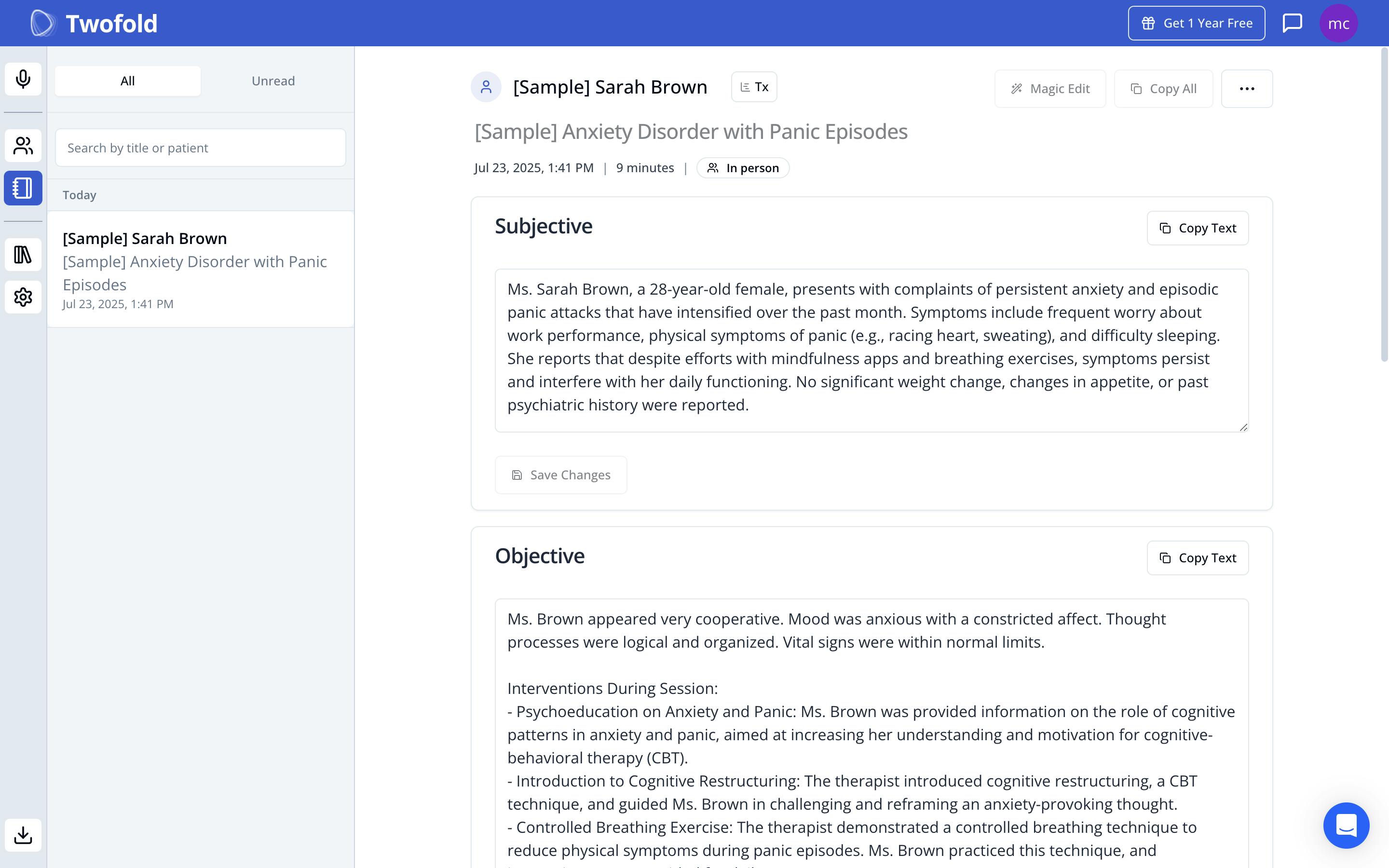
Twofold Health offers flexible documentation support for therapists. It generates SOAP, DAP, and BIRP progress notes, intake notes, treatment plans, and summaries. Therapists can input via session recordings, dictated summaries, or uploaded notes. HIPAA/HITECH-compliant with a BAA, Twofold emphasizes security by processing audio without long-term storage.
Pros:
- Multiple input methods (record, dictate, or upload)
- Wide range of templates: SOAP, DAP, BIRP, intake, treatment plans
- Custom templates and styles
- Client progress tracking included
- Strong privacy stance (no permanent storage of recordings)
Cons:
- Higher monthly cost on flexible billing
- Group practice pricing requires custom quotes
Pricing: Free plan available; Personal plan at $49/month (annual billing) with unlimited notes, and Group plan with custom pricing for clinics and teams.
Best For: Solo therapists or group practices who want versatile, secure, and customizable progress note automation.
Quick Comparison Overview
Here’s how the top AI progress note generators stack up side by side:
Tool | Best For | Pricing |
|---|---|---|
Supanote | Therapy-specific EHR autofill | $19.99/mo (40 notes), $39.99/mo (100 notes), $69.99/mo unlimited (annual) |
Freed | High caseloads needing unlimited notes | $90/mo solo; $84/mo (2–9 users, annual); custom for 10+ |
Upheal | Notes + client insights | Free; Starter £19/mo; Premium £59/mo |
Quill | Therapists avoiding recordings | $20/mo unlimited (+$16/team user); custom enterprise |
AutoNotes | Multi-disciplinary providers | From $39/mo (per note pricing available) |
Mentalyc | Therapy-centric with many modalities | $19.99/mo (40 notes), $39.99/mo (100 notes), $69.99/mo unlimited |
DeepScribe | Enterprise-grade EHR integration | From $400/mo per provider |
Abridge | Hospital & large clinic settings | From $250/mo (estimated) |
Suki | Dictation-first workflows | Custom pricing (enterprise-focused) |
Twofold | Secure, customizable notes & templates | Free plan available, $49/mo annual; custom for teams |
Key Factors to Consider Before Choosing
Choosing the right AI progress note generator depends on your practice’s size, workflow, and compliance needs. Here are the main decision points that can help you navigate this decision:
- Preferred format → Do you need SOAP, DAP, BIRP, EMDR, or group therapy notes?
- Workflow fit → Do you want to record full sessions, dictate summaries, or just enter bullet points?
- Note quality → Are the AI-generated notes ready to submit, or do they need heavy editing?
- EHR integration → Will the tool push directly into your patient’s chart, or will you rely on copy-paste?
- Security → Is the tool HIPAA compliant, with a signed BAA to protect sensitive patient health information?
- Pricing model → Do you prefer per-note pricing, a basic plan with limits, or monthly unlimited notes?
- Practice type → Solo practice vs. group practices vs. enterprise, in every case the right fit may differ.
Making Your Decision
In the end, choosing the right AI progress note generator comes down to matching the tool with your workflow, caseload, and documentation needs. Here’s a quick guide:
- If you need therapy-specific compliance and templates → Supanote and Mentalyc are strongest.
- If seamless EHR autofill is your top priority → Supanote stands out with Super Fill.
- If you want unlimited notes via recordings → Freed is ideal.
- If you want analytics + notes → Upheal stands out.
- If you need bullet point simplicity without recordings → Quill fits best.
- If you’re in a multi-disciplinary clinic → AutoNotes and Suki work across specialties.
- If you want enterprise-grade documentation → DeepScribe and Abridge dominate.
- If you value customization and strict privacy → Twofold is a secure choice.
Ultimately, the best AI note generator is the one that matches your documentation habits, integrates smoothly into your workflow, and reduces your after-hours admin.
FAQs
Q1. Are AI progress note generators HIPAA-compliant?
A. Yes, most leading tools like Supanote, Freed, Mentalyc, and Twofold are HIPAA-compliant and provide a signed BAA. Always verify compliance before onboarding.
Q2. Do I need to record therapy sessions for AI notes?
A. Not always. Tools like Freed and Upheal rely on recordings, while Supanote, Quill, and Twofold allow shorthand notes, dictations, or bullet points.
Q3. Can AI-generated progress notes replace my clinical judgment?
A. No. These tools draft notes, but final approval and edits must be done by the therapist using their clinical expertise.
Q4. Which note formats are supported?
A. SOAP and DAP are most common, but platforms like Supanote, Mentalyc, and Twofold also support BIRP, EMDR, and group therapy formats.
Q5. Are AI progress notes accepted by insurance?
A. Yes—provided they include the required clinical details. Many platforms are designed to produce audit-ready, payer-friendly documentation.
Q7\6. How much time do these tools actually save?
A. Therapists report saving 50–80% of their note-writing time, depending on the tool and workflow.
Q7. Are free trials available?
A. Yes. Supanote, Freed, Mentalyc, and Twofold all offer free trial options to test before committing.
Q8. What’s the cheapest option?
A. Quill offers unlimited notes at $20/month, making it budget-friendly. Supanote and Mentalyc also have affordable entry-level tiers.
Q9. Which tool is best for group practices?
A. Supanote, Twofold, and Freed scale well for teams with features like org-wide BAAs and volume discounts.
Conclusion
For therapists, progress notes are essential, but they don’t have to drain your evenings. AI progress note generators make it possible to finish documentation faster, stay compliant, and focus more energy on clients instead of admin.
Whether you choose a therapy-specific platform like Supanote, a hands-free option like Freed, or a customizable solution like Twofold, the right tool can be a true game changer for your practice.
With AI handling the heavy lifting, you can reclaim your mental space, improve your work-life balance, and still deliver high-quality, compliant documentation every time.

